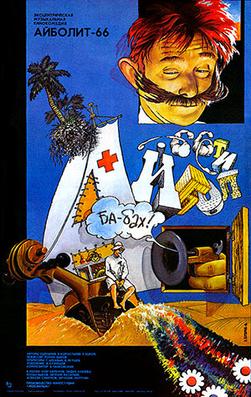Aybolit-66
Aybolit-66 is a Soviet children's film released in 1966, directed by Roland Bykov. The film is based on the character Doctor Aybolit, a kind veterinarian who can speak with animals, created by the Russian author Korney Chukovsky in his famous children's book. The story of Aybolit-66 revolves around the adventures of Doctor Aybolit and his journey to save animals in Africa from the evil Barmaley, a pirate and the main antagonist in the story. The film blends elements of fantasy, adventure, and comedy, and is remembered for its catchy songs, colorful costumes, and the moral lessons it imparts.
Plot[edit | edit source]
The plot of Aybolit-66 follows the titular character, Doctor Aybolit, as he receives a distress call from animals in Africa. They are being threatened by Barmaley, who captures the animals to sell them. Aybolit, accompanied by his animal friends, sets out on a daring mission to Africa to rescue the animals and confront Barmaley. Along the way, Aybolit and his companions face various challenges and adventures, showcasing the themes of bravery, kindness, and the importance of helping others.
Characters[edit | edit source]
- Doctor Aybolit - The protagonist, a kind-hearted veterinarian who can communicate with animals.
- Barmaley - The main antagonist, a pirate who threatens the peace and safety of animals in Africa.
- Other notable characters include Aybolit's animal friends who accompany him on his journey, each contributing their unique skills and personalities to the adventure.
Production[edit | edit source]
Directed by Roland Bykov, Aybolit-66 is notable for its creative use of costumes, set designs, and musical elements. The film's production involved innovative techniques for its time, creating a vibrant and engaging visual experience. The music in the film, particularly the songs, played a significant role in its popularity, becoming iconic among generations of viewers.
Legacy[edit | edit source]
Aybolit-66 holds a special place in Soviet cinema, particularly in the genre of children's films. Its enduring popularity is attributed to its timeless themes, memorable characters, and the universal message of compassion and altruism. The film has been a part of childhood for many who grew up in the Soviet Union and continues to be discovered by new generations of viewers.
See Also[edit | edit source]
Transform your life with W8MD's budget GLP1 injections from $125
W8MD offers a medical weight loss program NYC and a clinic to lose weight in Philadelphia. Our W8MD's physician supervised medical weight loss centers in NYC provides expert medical guidance, and offers telemedicine options for convenience.
Why choose W8MD?
- Comprehensive care with FDA-approved weight loss medications including:
- loss injections in NYC both generic and brand names:
- weight loss medications including Phentermine, Qsymia, Diethylpropion etc.
- Accept most insurances for visits or discounted self pay cost.
- Generic weight loss injections starting from just $125.00 for the starting dose
- In person weight loss NYC and telemedicine medical weight loss options in New York city available
- Budget GLP1 weight loss injections in NYC starting from $125.00 biweekly with insurance!
Book Your Appointment
Start your NYC weight loss journey today at our NYC medical weight loss, and Philadelphia medical weight loss Call (718)946-5500 for NY and 215 676 2334 for PA
Search WikiMD
Ad.Tired of being Overweight? Try W8MD's NYC physician weight loss.
Semaglutide (Ozempic / Wegovy and Tirzepatide (Mounjaro / Zepbound) available. Call 718 946 5500.
Advertise on WikiMD
|
WikiMD's Wellness Encyclopedia |
| Let Food Be Thy Medicine Medicine Thy Food - Hippocrates |
Translate this page: - East Asian
中文,
日本,
한국어,
South Asian
हिन्दी,
தமிழ்,
తెలుగు,
Urdu,
ಕನ್ನಡ,
Southeast Asian
Indonesian,
Vietnamese,
Thai,
မြန်မာဘာသာ,
বাংলা
European
español,
Deutsch,
français,
Greek,
português do Brasil,
polski,
română,
русский,
Nederlands,
norsk,
svenska,
suomi,
Italian
Middle Eastern & African
عربى,
Turkish,
Persian,
Hebrew,
Afrikaans,
isiZulu,
Kiswahili,
Other
Bulgarian,
Hungarian,
Czech,
Swedish,
മലയാളം,
मराठी,
ਪੰਜਾਬੀ,
ગુજરાતી,
Portuguese,
Ukrainian
Medical Disclaimer: WikiMD is not a substitute for professional medical advice. The information on WikiMD is provided as an information resource only, may be incorrect, outdated or misleading, and is not to be used or relied on for any diagnostic or treatment purposes. Please consult your health care provider before making any healthcare decisions or for guidance about a specific medical condition. WikiMD expressly disclaims responsibility, and shall have no liability, for any damages, loss, injury, or liability whatsoever suffered as a result of your reliance on the information contained in this site. By visiting this site you agree to the foregoing terms and conditions, which may from time to time be changed or supplemented by WikiMD. If you do not agree to the foregoing terms and conditions, you should not enter or use this site. See full disclaimer.
Credits:Most images are courtesy of Wikimedia commons, and templates, categories Wikipedia, licensed under CC BY SA or similar.
Contributors: Prab R. Tumpati, MD



